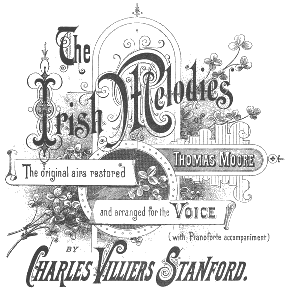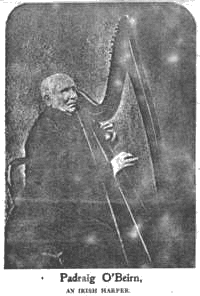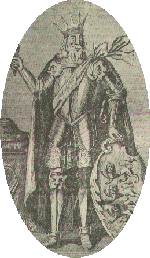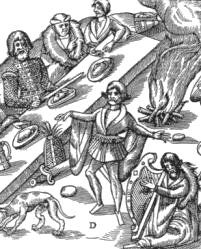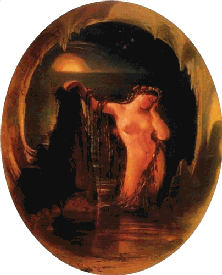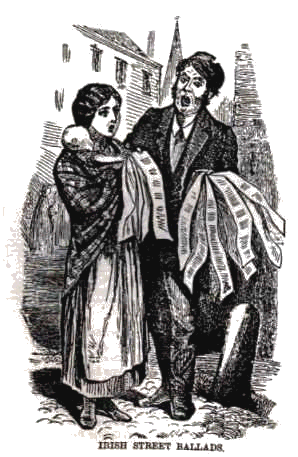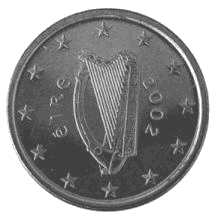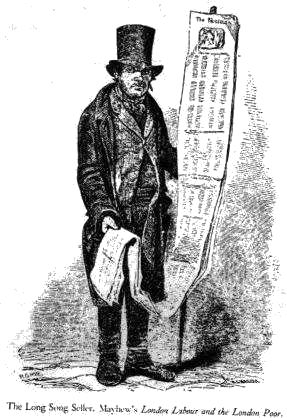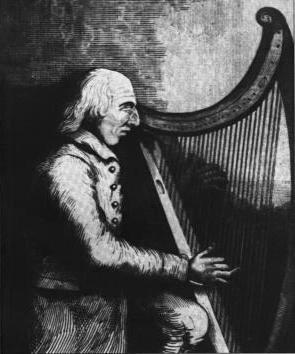|

Thomas Moore was born in Dublin on the 28th of May 1780. Both his parents
were Roman-Catholics; and he was, as a matter of course, brought up in the
same religion, and adhered to it -- not perhaps with any extreme
zeal -- throughout his life. His father was a decent tradesman, a grocer and
spirit-retailer -- or "spirit-grocer," as the business is termed in Ireland.
Thomas received his schooling from Mr. Samuel Whyte, who had been
Sheridan's first preceptor, a man of more than average literary culture.
He encouraged a taste for acting among the boys: and Moore, naturally
intelligent and lively, became a favorite with his master, and a leader in
the dramatic recreations.
His aptitude for verse appeared at an early age. In 1790 he composed an
epilogue to a piece acted at the house of Lady Borrows, in Dublin; and in
his fourteenth year he wrote a sonnet to Mr. Whyte, which was published in
a Dublin magazine.
Like other Irish Roman-Catholics, galled by the hard and stiff collar of
Protestant ascendancy, the parents of Thomas Moore hailed the French
Revolution, and the prospects which it seemed to offer of some reflex
ameliorations. In 1792 the lad was taken by his father to a dinner in
honor of the Revolution; and he was soon launched upon a current of ideas
and associations which might have conducted a person of more
self-oblivious patriotism to the scaffold on which perished the friend of
his opening manhood, Robert Emmet. Trinity College, Dublin, having been
opened to Catholics by the Irish Parliament in 1793, Moore was entered
there as a student in the succeeding year. He became more proficient in
French and Italian than in the classic languages, and showed no turn for
Latin verses. Eventually, his political proclivities, and intimacy with
many of the chiefs of opposition, drew down upon him (after various
interrogations, in which he honorably refused to implicate his friends) a
severe admonition from the University authorities; but he had not joined
in any distinctly rebellious act and no more formidable results ensued to
him.
In 1793 Moore published in the "Anthologia Hibernica" two pieces of verse;
and his budding talents became so far known as to earn him the proud
eminence of Laureate to the Gastronomic Club of Dalkey, near Dublin, in
1794. Through his acquaintance with Emmet, he joined the Oratorical
Society, and afterwards the more important Historical Society; and he
published "An Ode on Nothing, with Notes, by Trismegistus Rustifucius, D.
D.", which won a party success. About the same time he wrote articles for
"The Press", a paper founded towards the end of 1797 by O'Connor, Addis,
Emmet, and others. He graduated at Trinity College in November, 1799.
The bar was the career which his parents, and especially his mother,
wished Thomas to pursue; neither of them had much faith in poetry or
literature as a resource for his subsistence. Accordingly, in 1799, he
crossed over into England, and studied in the Middle Temple; and he was
afterwards called to the bar, but literary pursuits withheld him from
practicing. He had brought with him from Ireland his translations from
Anacreon; and published these by subscription in 1800, dedicated to the
Prince Regent (then the illusory hope of political reformers), with no
inconsiderable success. Lord Moira, Lady Donegal, and other leaders of
fashionable society, took him up with friendly warmth, and he soon found
himself a well-accepted guest in the highest circles in London. No clever
young fellow -- without any advantage of birth or of person, and with
intellectual attractions which seem to posterity to be of a rather
middling kind -- ever won his way more easily or more cheaply into that
paradise of mean ambitions, the "beau monde". Moore has not escaped
the stigma which attaches to almost all men who thus succeeded under the
like conditions -- that of tuft-hunting and lowering compliances. He would
be a bold man who should affirm that there was absolutely no sort of
ground for the charge; or that Moore -- fêted at Holland House, and
hovered-round by the fashionable of both sexes, the men picking up his
witticisms, and the women languishing over his songs -- was capable of the
same sturdy self-reliance and simple adhesion to principle which might
possibly have been in him, and forthcoming from him, under different
conditions. Who shall touch pitch and not be defiled, -- who treacle, and
not be sweetened? At the same time, it is easy to carry charges of this
kind too far, and not always through motives the purest and most exalted.
It may be said without unfairness on either side that the sort of talents
which Moore possessed brought him naturally into the society which he
frequented; that very possibly the world has got quite as much out of him
by that development of his faculties as by any other which they could have
been likely to receive; and that he repaid patronage in the coin of
amusement and of bland lenitives, rather than in that of obsequious
adulation. For we are not required nor permitted to suppose that there was
the stuff of a hero in "little Tom Moore;" or that the lapdog of the
drawing-room would under any circumstances have been the wolf-hound of the
public sheepfold. In the drawing-room he is a sleeker lapdog, and lies
upon more and choicelier-clothed laps than he would in "the two-pair
back;" and that is about all that needs to be said or speculated in such a
case. As a matter of fact, the demeanor of Moore among the socially great
seems to have been that of a man who respected his company, without
failing to respect himself also -- any ill-natured caviling or ready-made
imputations to the contrary notwithstanding.
In 1802 Moore produced his first volume of original verse, the "Poetical
Works of the late Thomas Little" (an allusion to the author's remarkably
small stature), for which he received £60. There are in this volume some
erotic improprieties, not of a very serious kind either in intention or in
harmfulness, which Moore regretted in later years. Next year Lord Moira
procured him the post of Registrar to the Admiralty Court of Bermuda; he
embarked on the 25th of September, and reached his destination in January
1804. This work did not suit him much better than the business of the bar;
in March he withdrew from personal discharge of the duties: and, leaving a
substitute in his place, he made a tour in the United States and Canada.
He was presented to Jefferson, and felt impressed by his republican
simplicity. Such a quality, however, was not in Moore's line; and nothing
perhaps shows the essential smallness of his nature more clearly than the
fact that his visit to the United States, in their giant infancy, produced
in him no glow of admiration or aspiration, but only a recrudescence of
the commonest prejudices -- the itch for picking little holes, the petty joy
of reporting them, and the puny self-pluming upon fancied or factitious
superiorities. If the washy liberal patriotism of Moore's very early years
had any vitality at all, such as would have qualified it for a harder
struggle than jeering at the Holy Alliance, and singing after-dinner songs
of national sentimentalism to the applause of Whig lords and ladies, this
American experience may beheld to have been its death-blow. He now saw
republicans face to face; and found that they were not for him, nor he for
them. He returned to England in 1806; and soon afterwards published his
"Odes and Epistles", comprising many remarks, faithfully expressive of his
perceptions, on American society and manners.
The volume was tartly criticised in the "Edinburgh Review" by Jeffrey, who
made some rather severe comments upon the improprieties chargeable to
Moore's early writings. The consequence was a challenge, and what would
have been a duel at Chalk Farm, but for unloaded pistols and police
interference. This "fiasco" soon led to an amicable understanding between
Moore and Jeffrey; and a few years later, about the end of 1811, to a
friendship of closer intimacy between the Irish songster and his great
poetic contemporary Lord Byron. His lordship, in his youthful satire of
"English Bards and Scotch Reviewers", had made fun of the unbloody duel.
This Moore resented, not so much as a mere matter of ridicule as because
it involved an ignoring or a denial of a counter-statement of the matter
put into print by himself. He accordingly wrote a letter to Byron on the
1st of January 1810, calculated to lead to further hostilities. But, as
the noble poet had then already for some months left England for his
prolonged tour on the Continent, the missive did not reach him; and a
little epistolary skirmishing, after his return in the following year,
terminated in a hearty reconciliation, and a very intimate cordiality,
almost deserving of the lofty name of friendship, on both sides.
Re-settled in London, and re-quartered upon the pleasant places of
fashion, Moore was once more a favorite at Holland House, Lansdowne House,
and Donington House, the residence of Lord Moira. His lordship obtained a
comfortable post to soothe the declining years of Moore's father, and held
out to the poet himself the prospect -- which was not however realized -- of
another snug berth for his own occupancy. The United Kingdom of Great
Britain and Ireland never received the benefit of the Irish patriot's
services in any public capacity at home -- only through the hands of a
defaulting deputy in Bermuda: it did, however, at length give him the
money without the official money's-worth, for in 1835, under Lord
Melbourne's ministry, an annual literary pension of £300 was bestowed upon
the then elderly poet. Nor can it be said that Moore's worth to his party,
whether we regard him as political sharpshooter or as national lyrist,
deserved a less recognition from the Whigs: he had at one time, with
creditable independence, refused to be indebted to the Tories for an
appointment. Some obloquy has at times been cast upon him on account of
his sarcasms against the Prince Regent, which, however well merited on
public grounds, have been held to come with an ill grace from the man
whose first literary effort, the "Anacreon", had been published under the
auspices of his Royal Highness as dedicatee, no doubt a practical
obligation of some moment to the writer. It does not appear, however, that
the obligation went much beyond this simple acceptance of the dedication:
Moore himself declared that the Regent's further civilities had consisted
simply in asking him twice to dinner, and admitting him, in 1811, to a
fête in honor of the regency.
The life of Moore for several years ensuing is one of literary success and
social brilliancy, varied by his marrying in 1811, Miss Bessy Dyke, a lady
who made an excellent and devoted wife, and to whom he was very
affectionately attached, although the attractions and amenities of the
fashionable world caused from time to time considerable inroads upon his
domesticity. After a while, he removed from London, with his wife and
young family, to Mayfield Cottage, near Ashbourne, Derbyshire -- a somewhat
lonely site. His "Irish Melodies", the work by which he will continue best
known, had their origin in 1797, when his attention was drawn to a
publication named "Bunting's Irish Melodies", for which he occasionally
wrote the words. In 1807 he entered into a definite agreement with Mr.
Power on this subject, in combination with Sir J. Stevenson, who undertook
to compose the accompaniments. The work was prolonged up to the year 1834;
and contributed very materially to Moore's comfort in money matters and
his general prominence -- as his own singing of the Melodies in good society
kept up his sentimental and patriotic prestige, and his personal
lionizing, in a remarkable degree. He played on the piano, and sang with
taste, though in a style resembling recitative, and not with any great
power of voice: in speaking, his voice had a certain tendency to
hoarseness, but its quality became flute-like in singing. In 1811 he made
another essay in the musical province; writing, at the request of the
manager of the Lyceum Theatre, an operetta named "M.P., or the
Bluestocking". It was the reverse of a stage-success; and Moore, in
collecting his poems, excluded this work, save as regards some of the
songs comprised in it. In 1808 had appeared anonymously, the poems of
"Intolerance and Corruption", followed in 1809 by "The Sceptic".
"Intercepted Letters, or The Twopenny Postbag, by Thomas Brown the
Younger", came out in 1812: it was a huge success, and very intelligibly
such, going through fourteen editions in one year. In the same year the
project of writing an oriental poem -- a class of work greatly in vogue now
that Byron was inventing Giaours and Corsairs -- was seriously entertained
by Moore. This project took shape in "Lalla Rookh", written chiefly at
Mayfield Cottage -- a performance for which Mr. Longman the publisher paid
the extremely large sum of £3150 in advance: its publication hung over
till 1817. The poem has been translated into all sorts of languages,
including Persian, and is said to have found many admirers among its
oriental readers. Whatever may be thought of its poetic merits -- and I for
one disclaim any scintilla of enthusiasm -- or of its power in vitalizing
the "disjecta membra" of orientalism, the stock-in-trade of the Asiatic
curiosity-shop, there is no doubt that Moore worked very conscientiously
upon this undertaking: he read up to any extent, -- wrote, talked, and
perhaps thought, Islamically -- and he trips up his reader with some
allusion verse after verse, tumbling him to the bottom of the page, with
its quagmire of explanatory footnotes. In 1815 appeared the "National
Airs"; in 1816, "Sacred Songs, Duets, and Trios", the music composed and
selected by Stevenson and Moore; in 1818, "The Fudge Family in Paris",
again a great hit. This work was composed in Paris, which capital Moore
had been visiting in company with his friend Samuel Rogers the poet.
The easily earned money and easily discharged duties of the appointment in
Bermuda began now to weigh heavy on Moore. Defalcations of his deputy, to
the extent of £6000, were discovered, for which the nominal holder of the
post was liable. Moore declined offers of assistance; and, pending a legal
decision on the matter, he had found it apposite to revisit the Continent.
In France, Lord John (the late Earl) Russell was his travelling companion:
they went on together through Switzerland, and parted at Milan. Moore
then, on the 8th of October 1819, joined in Venice his friend Byron, who
had been absent from England since 1816. The poets met in the best of
humor, and on terms of hearty good-fellowship -- Moore staying with Byron
for five or six days. On taking leave of him, Byron presented the Irish
lyrist with the MS. of his autobiographical memoirs stipulating that they
should not be published till after the donor's death: at a later date he
became anxious that they should remain wholly unpublished. Moore sold the
MS. in 1831 to Murray for £2100, after some negotiations with Longman, and
consigned it to the publisher's hands. In 1824 the news arrived of Byron's
death. Mr. (afterwards Sir Wilmot) Horton on the part of Lady Byron, Mr.
Luttrell on that of Moore, Colonel Doyle on that of Mrs. Leigh, Lord
Byron's half-sister, and Mr. Hobhouse (afterwards Lord Broughton) as a
friend and executor of the deceased poet, consulted on the subject.
Hobhouse was strong in urging the suppression of the Memoirs. The result
was that Murray, setting aside considerations of profit, burned the MS.
(some principal portions of which nevertheless exist in print, in other
forms of publication); and Moore immediately afterwards, also in a
disinterested spirit, repaid him the purchase-money of £2100. It was quite
fair that Moore should be reimbursed this large sum by some of the persons
in whose behoof he had made the sacrifice, this was not neglected.
To resume. Bidding adieu to Byron at Venice, Moore went on to Rome with
the sculptor Chantrey and the portrait-painter Jackson. His tour supplied
the materials for the "Rhymes on the Road", published, as being extracted
from the journal of a travelling member of the Pococurante Society, in
1820, along with the "Fables for the Holy Alliance". Lawrence, Turner, and
Eastlake, were also much with Moore in Rome: and here he made acquaintance
with Canova. Hence he returned to Paris, and made that city his home up to
1822, expecting the outcome of the Bermuda affair. He also resided partly
at Butte Goaslin, near Sèvres, with a rich and hospitable Spanish family
named Villamil. The debt of £6000 was eventually reduced to £750: both the
Marquis of Lansdowne and Lord John Russell pressed Moore with their
friendly offers, and the advance which he at last accepted was soon repaid
out of the profits of the "Loves of the Angels" -- which poem, chiefly
written in Paris, was published in 1823. The prose tale of "The Epicurean"
was composed about the same time, but did not issue from the press till
1827: the "Memoirs of Captain Rock" in 1824. He had been under an
engagement to a bookseller to write a "Life of Sheridan". During his stay
in France the want of documents withheld him from proceeding with this
work: but he ultimately took it up, and brought it out in 1825. It was not
availed to give Moore any reputation as a biographer, though the reader in
search of amusement will pick out of it something to suit him. George the
Fourth is credited with having made a neat "bon mot" upon this book. Some
one having remarked to him that "Moore had been murdering Sheridan," --
"No," replied his sacred majesty, "but he has certainly attempted his
life." A later biographical performance, published in 1830, and one of
more enduring interest to posterity, was the "Life of Byron". This is a
very fascinating book; but more -- which is indeed a matter of course -- in
virtue of the lavish amount of Byron's own writing which it embodies than,
on account of the Memoir-compiler's doings. However, there is a
considerable share of good feeling in the book, as well as matter of
permanent value from the personal knowledge that Moore had of Byron; and
the avoidance of "posing" and of dealing with the subject for purposes of
effect, in the case of a man whose career and genius lent themselves so
insidiously to such a treatment, is highly creditable to the biographer's
good sense and taste. The "Life of Byron" succeeded, in the list of
Moore's writings, a "History of Ireland", contributed in 1827 to
"Lardner's Cyclopaedia", and the "Travels of an Irishman in Search of a
Religion", published in the same year: and was followed by a "Life of Lord
Edward Fitzgerald", issued in 1881. This, supplemented by some minor
productions, closes the sufficiently long list of writings of an
industrious literary life.
In his latter years Moore resided at Sloperton Cottage, near Devizes in
Wiltshire, Where he was near the refined social circle of Lord Lansdowne
at Bowood, as well as the lettered home of the Rev. Mr. Bowles at
Bremhill. Domestic sorrows clouded his otherwise cheerful and comfortable
retirement. One of his sons died in the French military service in
Algeria; another of consumption in 1842. For some years before his own
death, which occurred on the 25th of February 1853, his mental powers had
collapsed. He sleeps in Bromham Cemetery, in the neighborhood of
Sloperton.
Moore had a very fair share of learning, as well as steady application,
greatly as he sacrificed to the graces of life, and especially of "good
society." His face was not perhaps much more impressive in its contour
than his diminutive figure. His eyes, however, were dark and fine; his
forehead bony, and with what a phrenologist would recognize as large bumps
of wit; the mouth pleasingly dimpled. His manner and talk were bright,
abounding rather in lively anecdote and point than in wit and humor,
strictly so called. To term him amiable according to any standard, and
estimable too as men of an unheroic fibre go, is no more than his due.
No doubt the world has already seen the most brilliant days of Moore's
poetry. Its fascinations are manifestly of the more temporary sort: partly
through fleetingness of subject-matter and evanescence of allusion (as in
the clever and still readable satirical poems); partly through the aroma
of sentimental patriotism, hardly strong enough in stamina to make the
compositions national, or to maintain their high level of popularity after
the lyrist himself has long been at rest; partly through the essentially
commonplace sources and forms of inspiration which belong to his more
elaborate and ambitious works. No poetical reader of the present day is
the poorer for knowing absolutely nothing of "Lalla Rookh" or the "Loves
of the Angels". What then will be the hold or the claim of these writings
upon a reader of the twenty-first century? If we expect the satirical
compositions, choice in a different way, the best things of Moore are to
be sought in the "Irish Melodies", to which a considerable share of merit,
and of apposite merit, is not to be denied: yet even here what deserts
around the oases, and the oases themselves how soon exhaustible and
forgettable! There are but few thoroughly beautiful and touching lines in
the whole of Moore's poetry. Here is one --
"Come rest in this bosom, mine own stricken deer."
A great deal has been said upon the overpowering "lusciousness" of his
poetry, and the magical "melody" of his verse: most of this is futile.
There is in the former as much of "fadeur" as of lusciousness; and a
certain tripping or trotting exactitude, not less fully reducible to the
test of scansion than of a well-attuned ear, is but a rudimentary form of
melody -- while of harmony or rhythmic volume of sound Moore is as
decisively destitute as any correct versifier can well be. No clearer
proof of the incapacity of the mass of critics and readers to appreciate
the calibre of poetical work in point of musical and general execution
could be given than the fact that Moore has always with them passed, and
still passes, for an eminently melodious poet. What then remains? Chiefly
this. In one class of writing, liveliness of witty banter, along with
neatness; and, in the other and ostensibly more permanent class, elegance,
also along with neatness. Reduce these qualities to one denomination, and
we come to something that may be called "Propriety": a sufficiently
disastrous "raw material" for the purposes of a poet, and by no means
loftily to be praised or admired even when regarded as the outer
investiture of a nobler poetic something within. But let desert of every
kind have its place, and welcome. In the cosmical diapason and august
orchestra of poetry, Tom Moore's little Pan's-pipe can at odd moments be
heard, and interjects an appreciable and rightly-combined twiddle or two.
To be gratified with these at the instant is no more than the instrument
justifies, and the executant claims: to think much about them when the
organ is pealing or the violin plaining (with a Shelley performing on the
first, or a Mrs. Browning on the second), or to be on the watch for their
recurrences, would be equally superfluous and weak-minded.
A Biographical Sketch by
William M. Rossetti
The Complete Poems (Gutenberg)
Thomas Moore (Wikipedia)
Thomas Moore (Cath. Ency.)
Thomas Moore (Contemplator)
|
